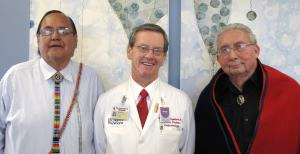Our Pediatric Diabetes and Endocrinology Section has been honored to develop lasting and mutually beneficial partnerships with Oklahoma American Indian nations and tribes, as well as the Oklahoma City Area Office of the Indian Health Service. The partnerships were initially established to provide care for American Indian children with the research relationship evolving over time.
The research relationship began in 2000 when leaders from our Section began discussions with the Absentee-Shawnee Tribe, Cherokee Nation, Chickasaw Nation, Choctaw Nation, and the Oklahoma  City Area Office of the Indian Health Service regarding their interest in research involving Type 2 diabetes in youth, a growing concern in American Indian communities. The pediatric endocrinologists began providing diabetes and endocrinology services on-site, within American Indian communities. Open conversations among the partners led to a formal partnering agreement in the first clinical trial for young people with Type 2 diabetes: “Treatment Options for Type 2 Diabetes in Youth and Adolescents" (TODAY), sponsored by the National Institutes of Health (NIH). Through this partnership, more than 40% of the participants screened were American Indians, an impressive number for a large, multi-site NIH clinical trial. The American Indian partners helped the TODAY Study’s leadership understand the unique cultural and historical factors involved in conducting research with American Indian communities, tailored the TODAY protocol to be culturally relevant, identified unique risks and benefits for American Indian participants, and assisted with the development of all publications and presentations. This partnership, in the TODAY study, was unprecedented in clinical research and is a model for future partnering research efforts with American Indians nations and tribes.
City Area Office of the Indian Health Service regarding their interest in research involving Type 2 diabetes in youth, a growing concern in American Indian communities. The pediatric endocrinologists began providing diabetes and endocrinology services on-site, within American Indian communities. Open conversations among the partners led to a formal partnering agreement in the first clinical trial for young people with Type 2 diabetes: “Treatment Options for Type 2 Diabetes in Youth and Adolescents" (TODAY), sponsored by the National Institutes of Health (NIH). Through this partnership, more than 40% of the participants screened were American Indians, an impressive number for a large, multi-site NIH clinical trial. The American Indian partners helped the TODAY Study’s leadership understand the unique cultural and historical factors involved in conducting research with American Indian communities, tailored the TODAY protocol to be culturally relevant, identified unique risks and benefits for American Indian participants, and assisted with the development of all publications and presentations. This partnership, in the TODAY study, was unprecedented in clinical research and is a model for future partnering research efforts with American Indians nations and tribes.
 When our Section moved into the new building in 2009, we were honored to receive a ceremonial Native American blessing provided by the leadership from the Oklahoma City Indian Clinic. The cedar ceremony signified a united effort towards health and wellness.
When our Section moved into the new building in 2009, we were honored to receive a ceremonial Native American blessing provided by the leadership from the Oklahoma City Indian Clinic. The cedar ceremony signified a united effort towards health and wellness.
Today, our Section continues to provide on-site diabetes and endocrinology services to American Indian patients in Ada, Ardmore, Durant, and Talihina. The development of a singular, multi-tribal research association has led to the development of other academic and research partnerships.
American Indian children born to mothers with diabetes during pregnancy are at increased risk for obesity and diabetes later in life. The Offspring Study, an NIH-funded study in partnership with the Chickasaw and Choctaw Nations, found that children burn fewer calories than expected because of a reduction in their capacity to utilize fat, even when the mother’s diabetes is well-controlled. Later studies also showed that is likely due to a reduction in mitochondria, the fat-metabolizing units in cells. With a better understanding of how a mother’s condition affects the health of her children as they grow, we can identify specific ways to improve their health and reduce the prevalence of diabetes and obesity in future generations.
The MOVE study, in partnership with the Choctaw Nation and funding from NIH, tested whether financial incentives would lead to greater frequency and/or duration of exercise in American Indian youth at high risk for developing diabetes. We learned that financial incentives increased the duration of exercise sessions but had minimal effects on exercise participation. In addition to gaining knowledge about what motivates young American Indians to exercise, we also learned how to conduct a randomized clinical trial in a rural American Indian community.
at high risk for developing diabetes. We learned that financial incentives increased the duration of exercise sessions but had minimal effects on exercise participation. In addition to gaining knowledge about what motivates young American Indians to exercise, we also learned how to conduct a randomized clinical trial in a rural American Indian community.
Over the last 20 years, our Section has learned a great deal from partnerships with American Indian nations and tribes, as well as the Oklahoma City Area Office of the Indian Health Service. We look forward to continuing to develop synergistic and respectful partnerships while deepening our understanding of clinical care and research with American Indians.